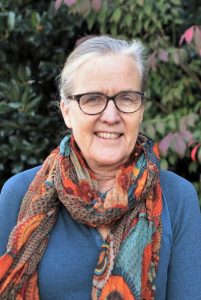HPDP Research Fellow Lindsey Smith Taillie, PhD, and HPDP Director Alice Ammerman, DrPH, have received a grant from the Environmental Protection Agency (EPA) to help households, especially low-income households, better prevent food waste. The project is expected to contribute to the EPA’s goal of halving U.S. household food waste.

About one-third of all food produced is not consumed, leading to food waste. Food waste occurs throughout the supply chain, but about half of all food waste takes place at the consumer level. This study will investigate reasons why consumers waste food and explore strategies to help households reduce and prevent food waste.
“I was shocked to learn how damaging food waste is to climate change and our environmental systems,” said Dr. Taillie. “This new EPA grant seemed like the perfect opportunity to begin working on developing solutions to reduce food waste while also promoting healthier dietary behaviors.”
“Food waste and food loss are major environmental, social, and economic challenges,” said Dr. Ammerman. “Preventing household food waste is critical to reducing food insecurity, maximizing the natural resources used in food production, preventing climate change, and ensuring a sustainable food supply.”
The study will explore consumer food waste across six stages: planning, shopping, storage, cooking, consumption, and disposal. In each stage, researchers will also examine attitudes toward food waste, social norms, and demographic and socioeconomic factors.
Recognizing the financial impact of food waste, the researchers will also explore how reducing food waste can improve food security in low-income households.
“Low-income and food-insecure households may face unique barriers to reducing food waste, such as limited availability of grocery stores and time scarcity,” said Dr. Taillie. “At the same time, these households may experience the most financial relief if they are able to implement food waste prevention strategies. Our hope is to help vulnerable households actually improve their food security.”
Drs. Taillie and Ammerman have assembled a community advisory committee comprised of individuals from state, county, tribal, and community organizations who are all focused on addressing food and agricultural issues relevant to reducing food waste. The committee will guide every stage of the research to ensure community interests are being centered throughout.

“HPDP has a long-standing history of building and sustaining diverse community partnerships to center community needs, goals, and resources in our research,” said Dr. Ammerman. “Lindsey and I feel strongly that we can build on existing community knowledge by centering voices from community members already engaged in all aspects of this work.”
Ultimately, the researchers plan to design a scalable and sustainable intervention to prevent food waste and distribute the resulting toolkit to local organizations, community members, researchers, advocacy groups, and other stakeholders. Drs. Taillie and Ammerman will collaborate with researchers and students from HPDP and the Global Food Research Program, a project of the Carolina Population Center at UNC Chapel Hill where Dr. Taillie serves as a faculty member. The three-year study is expected to conclude in December 2025.
Dr. Alice Ammerman, DrPH, is the director of HPDP and is the Mildred Kaufman Distinguished Professor in the department of nutrition in the UNC Gillings School for Global Public Health. Her research experience includes extensive cultural adaptation of nutrition and physical activity intervention materials and interventions at all levels of the socio-ecologic model.
Dr. Lindsey Smith Taillie, PhD, is a research fellow at HPDP, an associate professor in the department of nutrition in the UNC Gillings School for Global Public Health, and a faculty member Global Food Research Program. Her work focuses on evaluating food policy efforts in the U.S. and globally.
